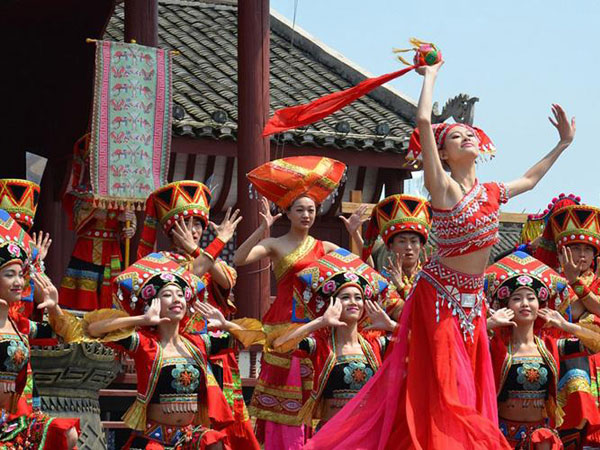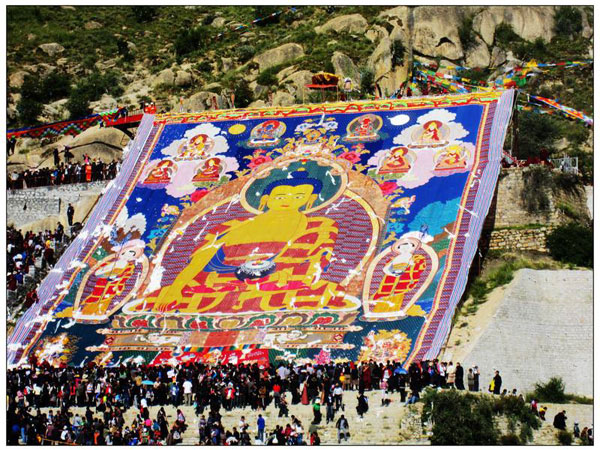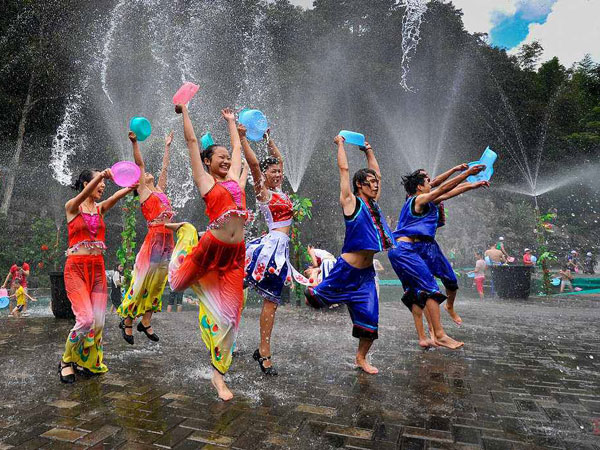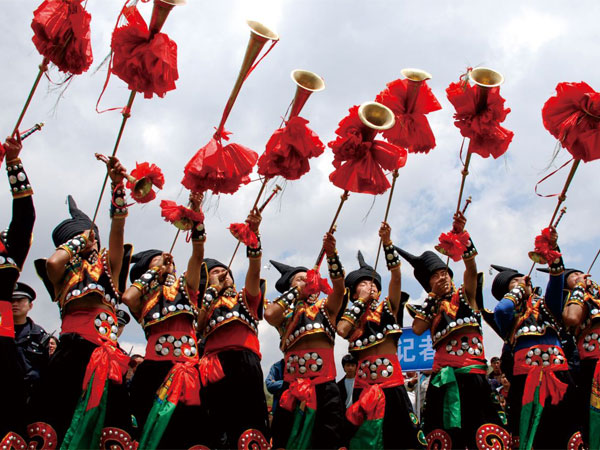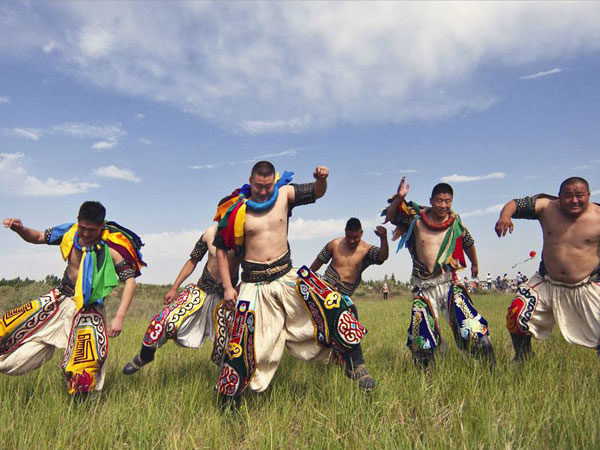The Double Third Festival
The Double Thrid Festival is an ancient Chinese zhuang people s traditional festival celebrated on the third day of the third lunar month in Chinese calendar. It is also known as the Shangsi Festival in west.The zhuang people have always being loving and good at singing, they hold several singing galas every year and the double third festival is the biggest ones each year. During the festival people would cook five-colored rice and colorful eggs to eat and celebrate.the most important thing to do on this is to go to court participating the singing matches.Many traders of course seeking this days as a great time for sell given that almost everyone would come to the court for celebrating. The youth men and women would join the singing match to meet new friends or lovers while the married ones with their kids and the elderly could spend all day strolling in the busy market for shopping and fun.after the singing there are some games for those young people to play with providing them a chance to exchange gifts with their newly met right guys of girls. This holiday is also celebrated in Korea and Japan as well.
The Sho Dun Festival
The Sho Dun Festival is a traditional festival held among Zang people in Lhasa Tibet,China.it can be traced back as early as 11 century.in zang language it means yogurt festival. In budda religion, the monks are not allowed to go out in a certain period of time until in summer when the festival is coming, so the lay people would give some yogurt for the monks who come out from the temple on those days.In the 17th century,the time of Qing dynasty,many famous play troupes had started to go to Lhasa to perform some shows for people to have a good time during the festivals.Therefore, it actually started as a festival for yogurt feast then become a time for drama show and dancing display.It usually lasts 4 to 5 days, during the festival, people in Lhasa would wear their colorful tradition suits to go to street to watch those dance plays and performers. When it comes to the afternoon, people would go to their friends and relatives’ houses for a visit and celebrating together.When anyone come to your house on these days, the hosts are supposed to sing several songs to put the guests in a mood for a good banquet. Over the meal, everyone would sing and dance and have a great time. The grounds of the Norbulingka would be filled with partying groups and state-run troupes and everywhere would be decorated with colored hanging rugs and printed canvas and people would linger around late at night around bonfires singing and dancing.From 2004,to make it easier for tourist to visit,the municipal government of Lhasa have decided to hold the yogurt festival on 18th of august every year yet remain the old transitional of display the Buddha statues activity of this festival on the same old date which is the last day of the zang calendar according to the tradition .
The Water-splashing Festival
The Water-Splashing Festival is the most significant festival among the Dai people in China and also the most widely participated festival by all kinds of people with diversified backgrounds in Yunnan province. The water-splashing festival is actually the new year of the Dai people according to their calender, it generally lasts 3 to 7 days and falls in the middle of April in modern calender.
The festival originated form a myth tale in ancient time. The legend went this: there was a evil demon lived near the Dai village and take seven of the most pretty girls from the village for his kept wives, and the seven girls in doing a good thing for their whole village and get their freedom back, had decided to kill the demon by themselves.using their outstanding wisdom and brave heart they finally cut his throat but when they had chopped his head , everywhere his head dropped, there were a big fire lighted up, so the girls pick the head immediately to stop the disaster.They took turns to hold his head and each one hold for a year.and every year when they change turns, the girls and other villages keep splashing water on the girls to prevent fire and to wash up the tiredness and bad luck off the girls.
Today, in those tourist cities in Yunnan province the water-splashing festival has become a much more well participated party among tourists .yet among those traditional Dai people, they would remain to wear their most beautiful clothes and take a bow of fresh water to splash on their loved ones to celebrate.With all the other activities such as boat racing and singing and dancing going on. The water-splashing festival is really a big event.
Torch Festival
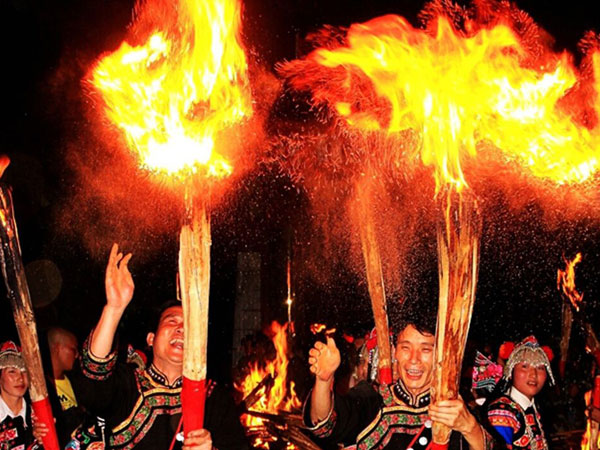
The Torch Festival or Fire Festival is the biggest festival celebrated among the yi people in southwest china like Yunnan Guizhou and Sichuan province.it is also celebrated by other ethnic groups of the region such as the Bai, Naxi, Jinuo and Luhu people. It falls on the 24th or 25th day of the sixth month in Chinese calendar .lasting for three days, every Yi people would light up a bonfire in front of their house and celebrate it by holding wrestling matches, horse racing, dance shows .The purpose of lighting fires is used to drive away disease and bad energy and celebrate for a good coming harvest
Legend of the torch festival
The festival is said to have originated in memory of a hero in ancient times. The legend goes that there was a hero called Heitibala. He was respected by the Yi people very much for his brave heart and the uprightness of his behaviour. His lover was a beautiful girl called Nizhangazhi unfortunately, in a fit of jealousy of his beautiful girlfriend, the ‘strength god’, had decided to hold a wrestling match with him and was hoping to kill him and win his beautiful lover. But in the end, the god got himself killed during the wrestling match. So the god king was furious with anger and had decided to release thousands upon thousands of locusts to ruin their crops to create a famine. In protecting their crops, Heitibala lead his villagers to light up torches to burn away all the locusts, and finally they saved their crops but Heitibala died from all his efforts and become a big mountain and Nizhangazhi turned into the mountain flowers sitting next to him. Therefore in memory of this brave hero, people light up torches every year on this day which is the 24th of sixth month of the year, to pray for a good harvest.There are also many other legends about the origin of the Torch Festival, all of them have the purpose of offering a blessing or sacrifice to and wish for a harvest.
Lusheng Festival
Lusheng Festival is the most well celebrated festival among the Miao ethnic people which live mainly in Human and Guizhou provinces in China. Unlike the other festivals having certain dates,the lucheng festival often celebrated by different groups of Miao people at different times, but it mainly starts from the beginning of the ninth lunar month to the first lunar month of next year.it generally would last 4 to 5 days.Starting with a ritual conducted by a very honorable man of their group,people would go out to a big plat plot with their most beautiful dresses all kinds of sliver accessories singing and dancing while the man would playing lusheng which is ethnic instruments invented by their people in the first place.
Nadam Fair
Nadam Fair is traditional fair among inner mongolian people in north China.Nadam in mongolian language means entertainment and games.Every year during July and August when the great grass land in the inner mongalia turns into a vast green plain with beautiful flowers dotting on it. People would hold horse racings,wrestling matches,roping horses matches and archery matches. One whoever wins the match will be treated like a hero indeed.meanwhile during the fair, the mongolian girls would dress up their traditional dresses and dancing and singing. The Nadam fair has been added into the national culture intangible heritage list by the state council on 20th May, 2006.

